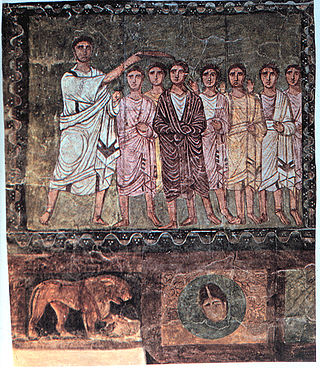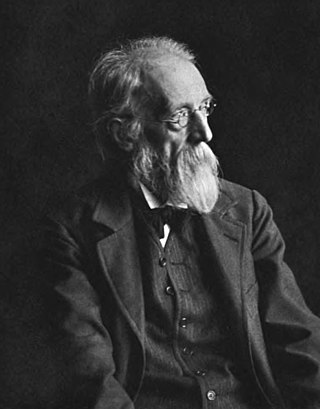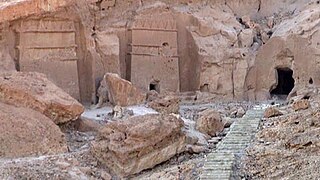
In Abrahamic religions, a messiah or messias is a saviour or liberator of a group of people. The concepts of mashiach, messianism, and of a Messianic Age originated in Judaism, and in the Hebrew Bible, in which a mashiach is a king or High Priest traditionally anointed with holy anointing oil.

The Quran, also romanized Qur'an or Koran, is the central religious text of Islam, believed by Muslims to be a revelation directly from God (Allah). It is organized in 114 chapters which consist of individual verses. Besides its religious significance, it is widely regarded as the finest work in Arabic literature, and has significantly influenced the Arabic language. It is also the object of a modern field of academic research known as Quranic studies.

Sheba is an ancient kingdom mentioned in the Hebrew Bible and the Quran. It particularly features in the tradition of Orthodox Tewahedo in today's Yemen and is also asserted as the home of the Queen of Sheba, who is left unnamed in Jewish texts, but is known as Makeda in Ethiopian texts and as Bilqīs in Arabic texts. According to the Jewish historian Josephus, Sheba was the home of Princess Tharbis, who is said to have been the wife of Moses before he married Zipporah.

Theodor Nöldeke was a German orientalist and scholar, originally a student of Heinrich Ewald. He is one of the founders of the field of Quranic studies, especially through his foundational work titled the History of the Quran. His research interests ranged over Old Testament studies, Semitic languages and Arabic, Persian and Syriac literature. Nöldeke translated several important works of oriental literature and during his lifetime was considered an important orientalist. He wrote numerous studies and contributed articles to the Encyclopædia Britannica.

The Qur'an has been translated into most major African, Asian and European languages from Arabic.

Hud or Hood or Eber in other traditions, was a prophet and messenger of ancient Arabia mentioned in the Quran. The eleventh chapter of the Quran, Hud, is named after him, though the narrative of Hud comprises only a small portion of the chapter.
Saleh is a prophet mentioned in the Qur'an who prophesied to the tribe of Thamud in ancient Arabia, before the lifetime of the Islamic prophet Muhammad. The story of Salih is linked to the story of the She-Camel of God, which was the gift given by God to the people of Thamud when they desired a miracle to confirm that Salih was truly a prophet.

Shuaib, Shoaib, Shuayb or Shuʿayb is an ancient Midianite Prophet in Islam, and the most revered prophet in the Druze faith. Shuayb is traditionally identified with the biblical Jethro, Moses' father-in-law. Shuaib is mentioned in the Quran a total of 11 times. He is believed to have lived after Abraham, and Muslims believe that he was sent as a prophet to a community: the Midianites, who are also known as the Aṣḥāb al-Aykah, since they used to worship a large tree. To the people, Shuaib proclaimed the straight path and warned the people to end their fraudulent ways. When the community did not repent, God destroyed the community.

The Zabur is, according to Islam, the holy book of David, one of the holy books revealed by God before the Quran, alongside others such as the Tawrāh (Torah) and the Injīl (Gospel). Muslim tradition maintains that the Zabur mentioned in the Quran is the Psalms of David.

Al-Ahqaf is the 46th chapter (surah) of the Qur'an with 35 verses (ayat). This is the seventh and last chapter starting with the Muqattaʿat letters Hāʼ Mīm. Regarding the timing and contextual background of the believed revelation, it is one of the late Meccan chapters, except for verse 10 and possibly a few others which Muslims believe were revealed in Medina.

The Syro-Aramaic Reading of the Koran: A Contribution to the Decoding of the Language of the Koran is an English-language edition (2007) of Die syro-aramäische Lesart des Koran: Ein Beitrag zur Entschlüsselung der Koransprache (2000) by Christoph Luxenberg.
Following is a list of English translations of the Quran. The first translations were created in the 17th and 19th centuries by non-Muslims, but the majority of existing translations have been produced in the 20th and 21st centuries.

The Noble Qur'an is a translation of the Quran by Muhammad Muhsin Khan and Muhammad Taqi-ud-Din al-Hilali. It is available in many languages and is "widely and freely distributed to hajj pilgrims". It is published and printed at the King Fahd Complex for the Printing of the Holy Quran, which is said to produce ten million copies of the Quran every year.

Elisha was, according to the Hebrew Bible, a Jewish prophet and a wonder-worker. His name is commonly transliterated into English as Elisha via Hebrew, Eliseus via Greek and Latin, or Alyasa via Arabic, and Elyasa or Elyesa via Turkish. Also mentioned in the New Testament and the Quran,[6:86][38:48] Elisha is venerated as a prophet in Judaism, Christianity and Islam and writings of the Bahá'í Faith refer to him by name.
The Quran states that several prior writings constitute holy books given by God to the prophets and messengers amongst the Children of Israel, in the same way the Quran was revealed to Muhammad. These include the Tawrat, believed by Muslims to have been given by God to the prophets and messengers amongst the Children of Israel, the Zabur revealed to David (Dawud); and the Injil revealed to Jesus (Isa).
Prophets in Islam are individuals in Islam who are believed to spread God's message on Earth and serve as models of ideal human behaviour. Some prophets are categorized as messengers, those who transmit divine revelation, most of them through the interaction of an angel. Muslims believe that many prophets existed, including many not mentioned in the Quran. The Quran states: "And for every community there is a messenger." Belief in the Islamic prophets is one of the six articles of the Islamic faith.

The Ahmadiyya branch in Islam has relationships with a number of other religions. Ahmadiyya consider themselves to be Muslim, but are not regarded as Muslim by mainstream Islam. Mainstream Muslim branches refer to the Ahmadiyya branch by the religious slur Qadiani, and to their beliefs as Qadianism a name based on Qadian, the small town in India's Punjab region where the founder of Ahmadiyya, Mirza Ghulam Ahmad was born.
The Saheeh International translation is an English-language translation of the Quran that has been used by Islam's most conservative adherents. Published by the Publishing House (dar), dar Abul Qasim in Saudi Arabia, it is one of the world's most popular Quran translations.
Darussalam International Publishing & Distribution is a Saudi-based multilingual international publishing house which operates in 35 countries. It's the second-largest publisher of translations of the Islamic scripture (Qur'ān) in the world after King Fahd Complex.













